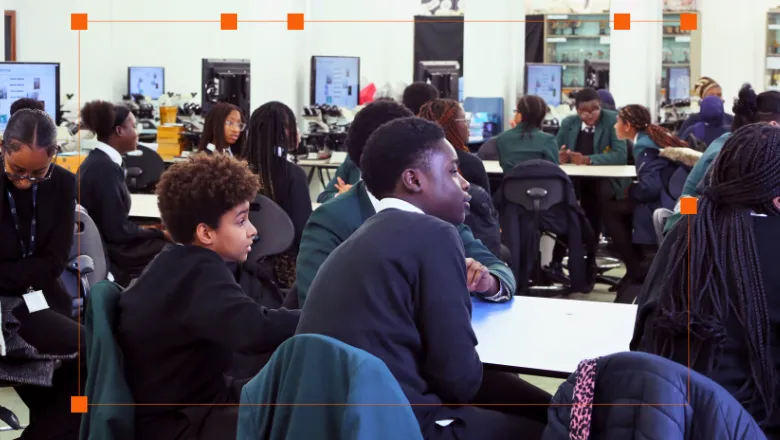The latest round of the Diversity Impact Programme has been dedicated to working with previously awarded universities to capture and share what works in the form of a series of user-friendly how-to guides. Through their creativity, dedication and passion to supporting underrepresented engineering students, we are now able to share evidence based best practices to other higher education institutions. This will allow the Programme's impact to continue past the length of each of our wonderful cohorts and improve the unequal learning experiences of underrepresented students for many years to come.”
Genevieve Dobinson‑Addo, Programme Manager, Equity, Diversity and Inclusion, Royal Academy of Engineering
23 October 2025
Breaking barriers and empowering Black students in STEM
Recent funding from the Royal Academy of Engineering’s Diversity Impact Programme (DIP) has enabled the development of a strategic implementation guide aimed at helping educational institutions adopt evidence-based approaches to better support underrepresented student groups.

In 2022, the School of Biomedical Engineering & Imaging Sciences and the Department of Engineering at King’s College London (KCL) launched the Success for Black Students (SFBS) programme to tackle the under-representation of Black students in its engineering programmes.
Black students continue to be underrepresented in engineering and physics due to systemic barriers in education and career advancement. The SFBS programme was created to address these disparities by offering tailored support through outreach initiatives, mentoring opportunities, research placements and skills development sessions.
Since its launch in 2022, the programme has engaged over 600 students through pre-university interventions and nearly 500 students in undergraduate interventions and related events. While long-term outcomes are still emerging, early signs point to promising increases in representation of Black students, as well as significant short-term progress.
A key milestone includes the development of a comprehensive implementation guide outlining practical strategies for advancing diversity and inclusion within engineering education.
Supported by the Department for Science, Innovation and Technology and the Royal Academy of Engineering through their Diversity Impact Programme, this resource draws on successful practices from the SFBS programme.
The guide is designed to be both practical and adaptable. It provides a scalable framework that institutions can customise to suit their unique contexts, aiming to close persistent gaps in representation and academic achievement. It includes practical, step-by-step guidance for implementation, case studies and tools for evaluating success and impact.
The guide was developed by a dedicated project working group at King’s College London (KCL), comprising:
- Professor Kawal Rhode, Professor of Biomedical Engineering, project co-lead and lead for the Outreach Workstream
- Dr Ernest Kamavuako, Reader in BioSignals and Sensors, project co-lead and lead for the Mentoring Workstream
- Dr Mandeep Gill Sagoo, Reader in Anatomy and Inclusive Education, project co-lead and lead for the Evaluation Workstream
- Sophie Rust, Project EDI coordinator and manager
- Oyinkansola Ayoade, Project officer
We were delighted to be asked by the Royal Academy of Engineering to produce a guide to our Success for Black Students project, so we can support other departments and institutions to run our programme. We have been fortunate to receive further funding since being awarded the Diversity Impact Programme grant back in 2022, allowing us to continue the Success for Black Engineers programme and expand it to include the Department of Physics at King’s. We look forward to increasing our impact and seeing the programme delivered more widely.”
Professor Kawal Rhode, co-lead of the Success for Black Students programme, Professor in Biomedical Engineering and the Head of Education, School of Biomedical Engineering and Imaging Sciences
The guide is intended to support a wide range of stakeholders involved in advancing equality, diversity and inclusion (EDI) and widening participation (WP) in STEM education. This includes universities launching EDI or WP initiatives, departments aiming to replicate SFBS-style programmes, and academics interested in contributing to or researching these efforts.
It also serves mentors, academic and industry professionals committed to student guidance, as well as support staff, student engagement leads, outreach coordinators and administrative teams. Additionally, the guide is a valuable resource for funders and policy makers in STEM education and access, particularly those assessing future funding opportunities.
It’s important that institutions have access to a guide like this if they’re looking to develop something like the SFBS programme. The guide is a practical ‘how-to’, covering everything from implementation and operations to mentoring, budgeting, evaluation and research allocation. We’ve also included a section on key challenges and how we addressed them. It’s a living resource, and we plan to keep updating it to ensure it stays relevant and useful.”
Oyinkansola Ayoade, Project Officer



